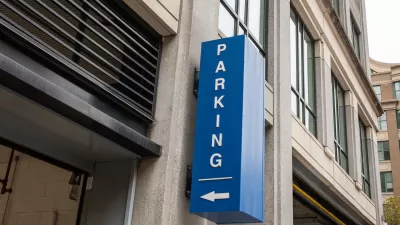Minneapolis and St. Paul both eliminated parking minimums, paving the way for less parking and more housing.

In an article originally published in Minnesota Reformer and reposted on Next City, Zak Yudhishthu outlines the Twin Cities’ success with parking reform.
Since St. Paul and Minneapolis voted to eliminate minimum parking requirements from their zoning codes, Minneapolis has seen less parking built and increased housing affordability. “The reduction in average parking spot per unit obscures an equally remarkable shift in the whole distribution of parking-unit ratios in Minneapolis. While some apartment developers have still opted to build relatively high quantities of parking, there’s been a rise in apartments with very little parking, or even none at all.”
The same type of data isn’t available for St. Paul, but anecdotal evidence shows that developers are taking advantage of the new rules to reduce the number of parking spots they build. In one case, a developer changed the design of a building from 91 housing units and 88 parking spots to 114 housing units and 82 parking spots. “More homes, less parking—and no need for a parking variance.”
While these results are far from radical, they indicate a positive trend that “reflect[s] a smart change that will improve the places that we live in,” Yudhishthu writes.
FULL STORY: Ending Minimum Parking Requirements Was A Policy Win For The Twin Cities

Planetizen Federal Action Tracker
A weekly monitor of how Trump’s orders and actions are impacting planners and planning in America.

Maui's Vacation Rental Debate Turns Ugly
Verbal attacks, misinformation campaigns and fistfights plague a high-stakes debate to convert thousands of vacation rentals into long-term housing.

San Francisco Suspends Traffic Calming Amidst Record Deaths
Citing “a challenging fiscal landscape,” the city will cease the program on the heels of 42 traffic deaths, including 24 pedestrians.

Amtrak Rolls Out New Orleans to Alabama “Mardi Gras” Train
The new service will operate morning and evening departures between Mobile and New Orleans.

The Subversive Car-Free Guide to Trump's Great American Road Trip
Car-free ways to access Chicagoland’s best tourist attractions.

San Antonio and Austin are Fusing Into one Massive Megaregion
The region spanning the two central Texas cities is growing fast, posing challenges for local infrastructure and water supplies.
Urban Design for Planners 1: Software Tools
This six-course series explores essential urban design concepts using open source software and equips planners with the tools they need to participate fully in the urban design process.
Planning for Universal Design
Learn the tools for implementing Universal Design in planning regulations.
Heyer Gruel & Associates PA
JM Goldson LLC
Custer County Colorado
City of Camden Redevelopment Agency
City of Astoria
Transportation Research & Education Center (TREC) at Portland State University
Jefferson Parish Government
Camden Redevelopment Agency
City of Claremont





























